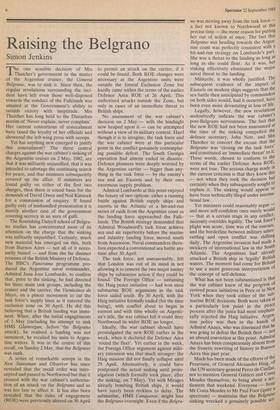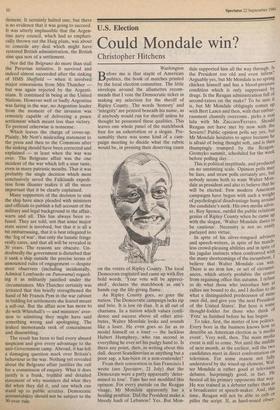Raising the Belgrano
Simon Jenkins
The one sensible decision of Mrs Thatcher's government in the matter of the Argentine cruiser, the General Belgrano, was to sink it. Since then, the regular revelations surrounding the inci-
dent have left even those well-disposed towards the conduct of the Falklands war amazed at the Government's ability to tarnish victory with ineptitude. Mrs Thatcher has long held to the Disraelian maxim of 'Never explain, never complain'. Her current contortions of concealment have taxed the loyalty of her officials and showered the left-wing press with scoops.
Yet has anything new emerged to justify this concealment? The three central charges against the war cabinet's sinking of the Argentine cruiser on 2 May, 1982, are that it was militarily unjustified, that it was intended to sabotage the continuing search for peace, and that ministers subsequently covered up the affair. If ministers are found guilty on either of the first two charges, then there is sound basis for the demands of David Owen and Neil Kinnock for a commission of enquiry. If found guilty only of mishandled presentation it is merely another case of the government covering secrecy in an aura of guilt.
The flourishing Dalyell school of Belgra- no studies has concentrated most of its attention on the charge that the sinking was militarily unjustified. Certainly, much new material has emerged on this, both from Buenos Aires — not all of it neces- sarily biased — and from the far dimmer recesses of the British Ministry of Defence. The BBC's Panorama programme pro- duced the Argentine naval commander, Admiral Juan Jose Lombardo, to confirm that, prior to the sinking, he had directed his three main task groups, including the cruiser and the carrier, the Vienticinco de Mayo, on a pincer movement to cut the task force's supply lines as it entered the exclusion zone on 30 April. He did this believing that a British landing was immi- nent. When, after the initial engagements of I May (including his attempt to sink HMS Glamorgan, before' the Belgrano attack), he realised a landing was not imminent, he recalled his units to Argen- tine waters. It was in the course of this recall, on Sunday 2 May, that the Belgrano was sunk.
A series of remarkable scoops in the New Statesman and Observer has since revealed that the recall order was inter- cepted and passed to Northwood but that it crossed with the war cabinet's authorisa- tion of an attack on the Belgrano and so was too late to affect it. It has also been revealed that the rules of engagement (ROE) were previously altered on 30 April
to permit an attack on the carrier, if it could be found. Both ROE changes were necessary as the Argentine units were outside the formal Exclusion Zone but hardly came within the terms of the earlier Defence Area ROE of 26 April. This authorised attacks outside the Zone, but only in cases of an immediate threat to British ships.
No assessment of the war cabinet's decision on 2 May — with the hindsight now heaped upon it — can be attempted without a view of its military context. Hard though it is to imagine, the task force and the war cabinet were at this particular point in the conflict genuinely contemplat- ing possible defeat. The South Georgia operation had almost ended in disaster. Defence planners were deeply worried by the Argentine carrier — bigger than any- thing in the task force — by the enemy's sea and air Exocets and by their own enormous supply problem.
Admiral Lombardo at this point enjoyed the luxury of two options: either a running battle against British supply ships and escorts in the Atlantic or a hit-and-run series of raids from the Argentine coast as the landing force approached the Falk- lands. The British strategy demanded that Admiral Woodward's task force achieve sea and air superiority before the marine and infantry landing force moved south from Ascension. Naval commanders there- fore expected a conventional sea battle any time after 30 April.
The task force, not unreasonably, felt that London was out of its mind in not allowing it to remove the two major enemy ships by submarine action if they could be found. The Foreign Office — sustaining the Haig peace initiative — had won most submarine ROE arguments as the task force sailed south. By 30 April, with the Haig initiative formally ended (for the time being), with conflict about to begin in earnest and with time wholly on Argenti- na's side, the war cabinet felt it could deny Northwood its wider ROE no longer.
Ideally, the war cabinet should have promulgated the new ROE earlier in the week, when it declared the Defence Area 'round the fleet'. Yet earlier in the week, the Foreign Office argument against milit- ary extension was that much stronger: the Haig mission did not finally collapse until 29 April. Alternatively, it could have postponed the actual sinking until prom- ulgation (which formally took place, after the sinking, on 7 May). Yet with Mirages already bombing British ships, it would have surely been reckless to delay. The submarine, HMS Conqueror, might lose the Belgrano overnight. Even if the Belgra- no was moving away from the task force a fact not known to Northwood at this precise time — the more reason for putting her out of action at once. The fact that Belgrano was heading towards the Argen- tine coast was perfectly consistent with a hit-and-run strategy on Lombardo's part. She was a threat to the landing as long as long as she could float. As it was, her sinking effectively eliminated the major naval threat to the landing.
Militarily, it was wholly justified. The subsequent evidence of the impact of Exocets on modern ships suggests that the sea battle then anticipated by commanders on both sides would, had it occurred, have been even more devastating in loss of life.
Legally, however, the new revelations undoubtedly indicate the war cabinet's post-Belgrano nervousness. The fact that the new ROE had not been announced at the time of the sinking compelled the defence secretary, John Nott, and Mrs Thatcher to concoct the excuse that the Belgrano was 'closing on the task for and constituted an 'immediate threat' to it. These words, chosen to conform to the terms of the earlier Defence Area ROE, were not true. The serious charge made in the current criticism is that they knew this — not when they took the decision but certainly when they subsequently sought to explain it. The sinking would appear to have been technically illegal under interna- tional law.
Yet ministers could reasonably argue -- and more self-confident ones surely would
— that at a certain stage in any conflict, necessity overrides legality. The task force s plight was acute, time was of the essence, and the borderline between military sabre- rattling and open conflict was shifting daily. The Argentine invasion had made a mockery of international law in the South Atlantic. The Argentines had alreadY attacked a British ship in 'legally'
British waters. The moment had come for Britain to use a more generous interpretation of the concept of self-defence.
What has not been substantiated is that the war cabinet knew of the progress of revived peace initiatives in Peru or in New York when they took either of the sub- marine ROE decisions. Both were taken at a particularly low point in the peace process after the junta had most emphati- cally rejected the Haig initiative. Argen- tine policy was then in the hands of Admiral Anaya, who was convinced that he was going to defeat the British fleet — not an absurd conviction at this point. Admiral Anaya has been conspicuously absent from the frenetic rewriting of history in Buenos Aires this past year. Much has been made of the efforts of the Peruvians, of General Alexander Haig, of the UN secretary-general Perez de Cuellar, not to mention General Galtieri and Costa Mendes themselves, to bring about a set- tlement that weekend. Everyone from Mr Costa Mendes to Mr Paul Foot (quite a spectrum) — maintains that the Be/gran° sinking wrecked a genuinely possible set'
tlement. It certainly halted one, but there is no evidence that it was going to succeed. It was utterly implausible that the Argen- tine navy council, which had so emphati- cally thrown out the Haig plans, was about to concede any deal which might have restored British administration, the British sine qua non of a settlement.
Nor did the Belgrano do more than stall the Peruvian initiative. It survived and indeed almost succeeded after the sinking of HMS Sheffield — when it involved major concessions from Mrs Thatcher but was again rejected by the Argenti- nians. It continued in being at the United Nations. However well or badly Argentina was faring in the war, no Argentine leader from the moment of the invasion was remotely capable of delivering a peace settlement which meant less than victory. To pretend otherwise is nonsense.
Which leaves the charge of cover-up. Plainly, Mr Nott's misleading statement to the press and then to the Commons after the sinking should have been corrected and explained — at least when the war was over. The Belgrano affair was the one incident of the war which left a sour taste, even in many patriotic mouths. That it was probably the single decision which most conclusively saved the Falklands expedi- tion from disaster makes it all the more important that it be clearly explained.
Many supporters of the decision to sink the ship have since pleaded with ministers and officials to publish a full account of the military and legal background to the affair, warts and all. This has always been re- fused. They are told, not that some major state secret is involved, but that it is all a bit embarrassing, that it is best relegated to the 'fog of war', that only the lunatic fringe really cares, and that all will be revealed in 30 years. The reasons are obscure. Un- doubtedly the government is disturbed that it sank a ship outside the precise terms of announced rules of engagement — despite most observers (including incidentally, Admiral Lombardo on Panorama) regard- ing it as militarily justified under the circumstances. Mrs Thatcher certainly was irritated that this briefly strengthened the hand of Mr Francis Pym in the war cabinet in bidding for settlements she feared meant a sell-out. But the affair now has more to do with Whitehall's — and ministers' aver- sion to admitting they might have said something wrong and apologising. The leaked memoranda reek of concealment and dissembling.
The result has been to fuel every absurd suspicion and give every advantage to the anti-Government camp. Abroad, it has left a damaging question mark over Britain's behaviour in the war. Nothing yet revealed about the Belgrano affair justifies the call for a commission of enquiry. What it does justify is a frank, truthful and detailed statement of why ministers did what they did when they did it, and one which can stand up to public scrutiny. Democratic accountability should not be subject to the 30-year rule.











































 Previous page
Previous page